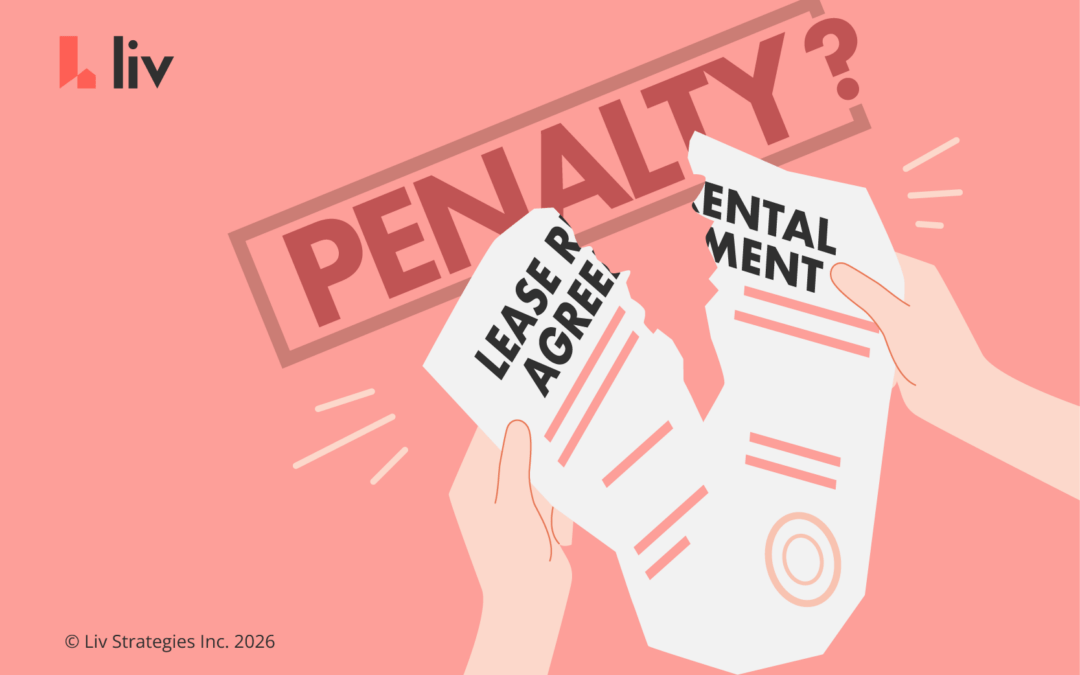Rental applications aren’t the easiest things in the world to deal with, but we hope we can make it easier for you.
We’re liv.rent, a platform with solutions for every step of the rental process, and we wanted to create a better way to rent.
You can subscribe and get the latest updates on the Toronto rental market straight to your inbox.
This is part one of our upcoming four-part series on applying for rentals in Ontario.
In this FAQ article, we’re answering some of the most common questions renters and first-time renters have about renting in Ontario. Let’s get started now!
liv.rent – Canada’s trusted house & apartment rental website
Search apartments, condos, and homes for rent.
What is a standard rental application?
A standard rental application is an information sheet that landlords give to applicants to fill out. The applicant will then need to add their relevant information and return it to the landlord if they want to be considered for the suite.
The application is an overview of the suite. It’s also where a renter will share information about their identity, rental history, employment, and work history. They will also give consent to a credit check via this document, which a landlord can run to verify credit history.
Pro tip: for a smoother rental application process, just use liv.rent — once your application is approved, it gets automatically converted into a contract.
Learn more:
Why would you get denied for an apartment?
There are a number of reasons why someone might have their rental application turned down, here’s a summary of a few of the key reasons:
- Application data
- If the application was incorrectly filled out or was missing key information.
- Income
- If the income appears to be too low to be able to comfortably afford to pay rent consistently. Note: Landlords are looking to see that you can pay no more than 1/3 of your monthly income on rent.
- References
- If references were missing, unreachable, or did not provide good information.
- Credit
- If the applicant didn’t provide details to run a credit check or had an unimpressive credit score.
- Preferences
- If the applicant indicated that they had pets or were a smoker, and the unit expressly does not allow either.
Pro tip: increase the chances of your application being accepted by filling in the necessary information on liv.rent’s online application form.
Learn more:
Does getting denied for an apartment hurt your credit?
No, getting denied for an apartment doesn’t hurt your credit. Each credit check that a potential landlord runs may have an impact on your credit score, however.
Learn more:
Why would you get approved for an apartment?
Landlords are looking for tenants who have good references, good credit, who are financially stable, and who they can trust to take care of their rental unit as if it were their own.
Getting approved for an apartment is usually the result of demonstrating that trustworthiness and reliability through your application.
Learn more:
What credit score is needed to rent an apartment in 2024?
It’s up to each landlord to interpret credit scores and reports. Generally speaking, the ranking of scores looks like this:
- Under 580 — Poor
- 580 to 669 — Fair
- 670 to 739 — Good
- 740 to 799 — Very Good
- 800+ — Excellent
On liv.rent, we use the Trust Score as a rating system to determine and communicate a renter’s credibility. It’s more comprehensive than a credit check alone, encompassing social proof and income verification, and it’s a convenient way for renters to showcase their suitability.
Learn more:
Do apartments do a hard credit check?
It depends. Landlords can perform hard, soft, or no credit checks as part of their tenant screening process.
Before you submit an application, you can ask a landlord what their credit checking process is. You can always state that you would prefer a soft vs. a hard credit check and ultimately it’s up to the landlord to determine what’s best for them.
Can I rent an apartment with a low credit score?
Yes, you can rent an apartment with a low credit score. However, to successfully rent a suite by improving your credit or by providing supplemental information on your income and financial history. Otherwise, it may be more difficult for you to secure the apartment over other applicants with stronger credit.
While a credit score is an important metric, it does not tell the whole story of who you are as a renter. That’s why on liv.rent, we use the more comprehensive rating system, Trust Score, and we also give renters more opportunities to posit themselves as an ideal candidate.
Do apartments check Equifax or TransUnion?
It’s up to each individual landlord which credit service they use, most typically they will use either Equifax or TransUnion.
How do you know if your rental application is denied?
Landlords do not have to inform you if your application has not been accepted.
It’s a good idea to check in again with them a few days after handing in your application — if they are doing their own credit check, that can take a day or two to come in as well.
Learn more:
Will I pass a credit check for renting?
Credit checks don’t have a pass or fail system. Ratings typically range from poor to excellent and are a signed a numbered score.
The best way to prepare for a credit check by a landlord is to get one for yourself. In Canada, you’re entitled to get a free copy of your credit report from Equifax and TransUnion. Knowing your own credit history is a good way to prepare for a rental application, especially if it’s your first time.
How do you know if you will get approved for an apartment?
Potential tenants will know that they have been approved because landlords reach successful applications by offering them the suite and inviting them to sign a standard lease agreement, thus beginning a tenancy.
Search for listings now:
Should I put my bank account number on a rental application?
Generally speaking, you do not have to put your bank account number on a rental application. In Canada, there are privacy laws in place that mean landlords can’t ask for a tenant’s banking information until both of you are ready to go forward with a lease.
At that point, you’ll need to pay rent somehow and often that’s by post-dated cheque or direct deposit, so your landlord will have some of your banking information at that stage.
Pro tip: on liv.rent, there are lots of convenient ways to pay for your rent.
Learn more:
Do landlords check your bank account balance?
Generally, landlords do not check your bank account balance. Mostly, they want to verify your credit to see that there are no red flags.
They also want to verify your income and employment, to know that you have money coming in and you’ll be able to afford to pay your rent on time. And even if you do provide cheques to your landlord, your bank will not disclose your balance to them.
There are two cases where it’s more common for a landlord to request to see your bank account balance:
- You are a student with no income
- You are a newcomer to Canada and you have not secured employment yet
In these cases, they want to make sure that you have enough savings, funding, or support from your family to be able to afford to pay rent consistently.
Learn more:
- Best Cities to Study in Canada for International Students
- Top 5 Rental Areas For Students | International Student Housing
- International Student Guide: Homestay vs. Renting Alone
How do I fill out a rental application with no rental history?
First-time renters might feel like they’re leaving chunks of their rental applications unfilled. Often, landlords like to see a rental history and be able to check or confirm with references that you’re reliable.
If you do not have a rental history, there are other ways to prove your reliability and trustworthiness as a renter.
On liv.rent, you can fill out your robust renter’s resume and we have an option to select “I am a first-time renter.” This shows the landlord right away why you do not have references and creates better communication and transparency.
Sign up now and get your renter’s resume application-ready.
What can a landlord not ask you?
There are things that landlords are allowed to ask you as part of your application process and things that are inappropriate for them to ask you.
Be informed of Ontario’s rules and guidelines on your rights and privacy before you share information with any landlord.
In general, landlords are allowed to confirm your identity, like with a government-issued ID. They cannot ask you personal questions about your race, nationality, gender identity or sexual orientation.
They also can’t ask you for money outside the scope of your lease, access to your suite without due notice, and can’t force you to sign a new fixed-term lease once yours is up.
Pro tip: when you use your liv.rent profile, called a renter’s resume, to apply for listings — you can choose to only share your information with verified landlords.
Learn more:
How do you make your rental application stand out?
Being well organized with your credit score already run and your references primed and ready to check will really set you apart in a sea of applications.
On liv.rent, you can also upload a photo of yourself ad fill out your “renter’s story,” which is a brief description of you as a renter. By proving this information and verifying your account, the landlord has more reason to trust you and could favour your application over one that doesn’t have this additional context.
Does the Trust Score impact the tenant’s credit score?
The Trust Score gathers information from renters’ Equifax® credit reports and will appear as an inquiry on their credit file. This may impact their overall credit score, however the impact will not be significant as the Trust Score is not a credit application and will not appear as a ‘hard’ credit inquiry.
Renting in Ontario
For information on renting in Ontario, refer to these resource posts about leases and evictions.
- Ontario Standard Lease Explained
- Frequently Asked Questions: Everything You Need to Know About Eviction in Ontario
- Renting: Changes During COVID-19
- PIPEDA: Personal Information Protection and Electronic Documents Act

Rethink The Way You Rent
Not on liv.rent yet? Experience the ease of digital applications & contracts, verified tenants & landlords, virtual tours and more – all on one platform. Sign up for free or download the app.
Subscribe to receive the latest tenant & landlord tips and get notified about changes in the Canadian rental market.
>> Stay up-to-date on the average rent in Vancouver, Toronto and Montreal: Rent Reports.



0 Comments